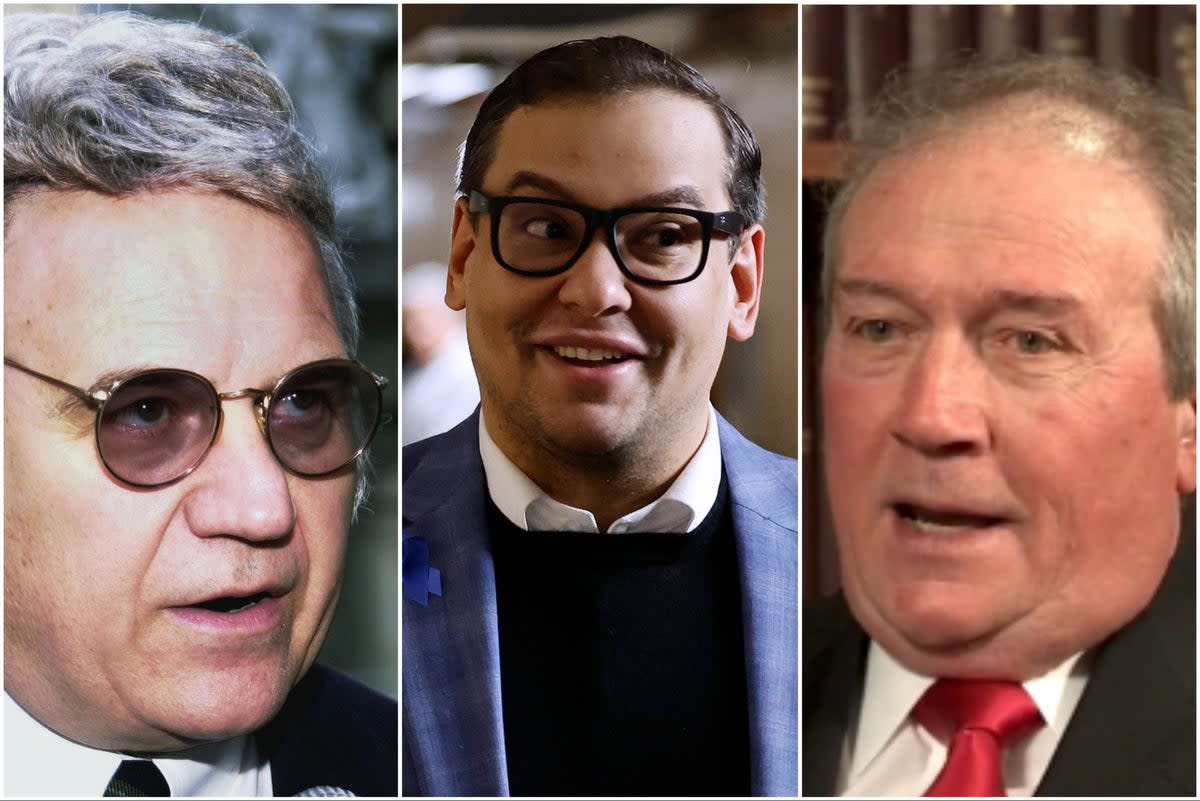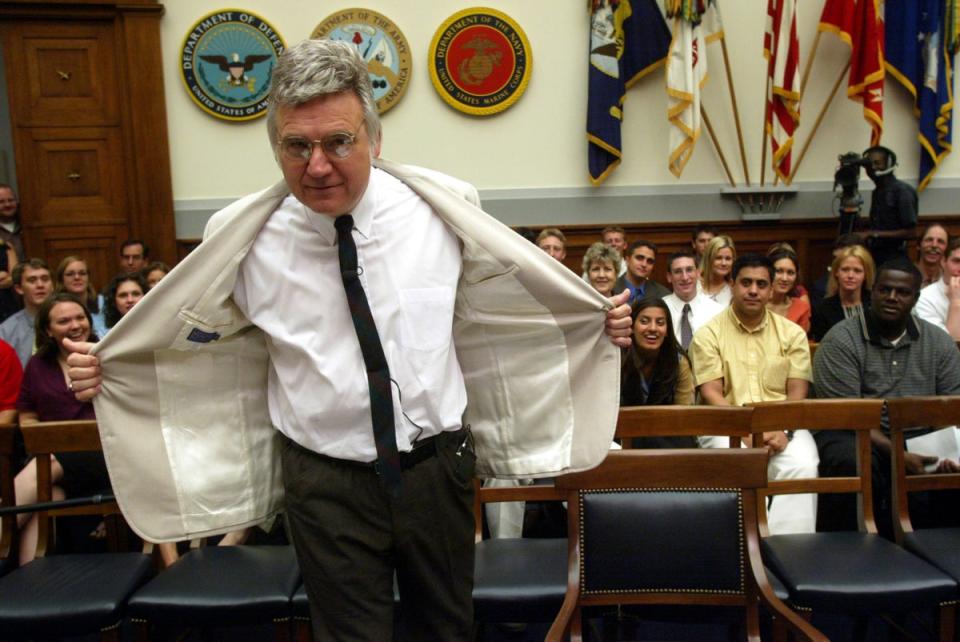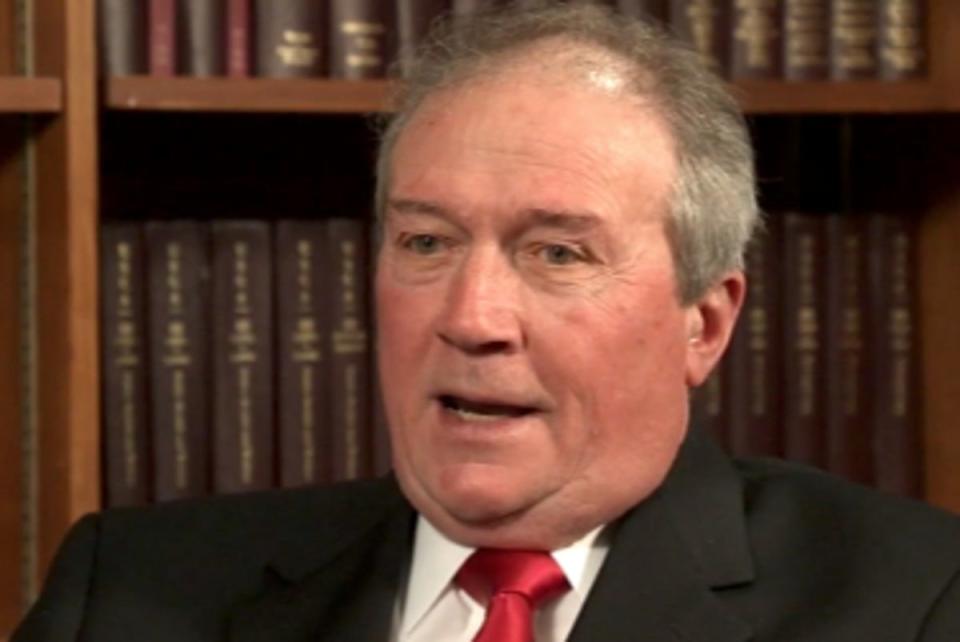Bribes, treason and hay bales: The scattered history of expulsions from Congress

- Oops!Something went wrong.Please try again later.
Scandal-plagued New York Rep George Santos looks set to join an exclusive group of people as he has acknowledged that he’s likely to be expelled from Congress.
“I know I’m going to get expelled when this expulsion resolution goes to the floor,” Mr Santos, 35, said last week in a broadcast on the X social media platform, formerly known as Twitter.
In the X Space event hosted by Monica Matthews, a rightwing personality, Mr Santos said, “I have done the math over and over and it doesn’t look really good”. But he claimed that he would wear his expulsion “like a badge of honour”.
The latest blow of many to Mr Santos’s short yet tumultuous political career came in the form of a 56-page report from the House Ethics Committee released earlier this month which outlined “substantial evidence” that Mr Santos violated federal law.
The report included allegations that Mr Santos used campaign money to pay for his personal expenses, such as Botox, and luxury purchases at Hermes and Ferragamo, as well as smaller sums spent on OnlyFans, food, parking, travel and rent.
The House can consider the motion to expel Mr Santos put forward by ethics panel chair GOP Rep Michael Guest as soon as Tuesday when lawmakers return from Thanksgiving break but when the vote may be taken up on the floor remains unclear.
Mr Santos would be the first member of the House to be removed in modern times without first having been convicted of a crime.
Only five representatives have ever been expelled from the House in the course of US history:
James Traficant
The Ohio Democrat served nine terms in the House between January 1985 and July 2002 when he was booted from the lower chamber following his conviction on racketeering, bribery, and fraud. He was only the second lawmaker to be expelled from the House since the Civil War.
His September 2014 obituary in The Washington Post referred to him as “one of the most deliberately outrageous members of Congress in history”.
“Glib and voluble, he was known for wearing cowboy boots, skinny ties and out-of-date polyester suits and for a bouffant mound of hair that seemed to defy gravity,” Matt Schudel wrote at the time.

The Los Angeles Times referred to it as a “Planet of the Apes sort of hair helmet,” while Washingtonian magazine wrote that it was “a creature from Lake Erie before it was cleaned up”.
Before joining Congress, he served as the sheriff of Mahoning Country. He was put on trial in 1983 after prosecutors acquired a tape that included him saying he had accepted more than $100,000 in bribes from organised crime. But despite his complete lack of legal training, Traficant represented himself and managed to argue that he had collected the bribes as part of a sting operation and he was acquitted.
He became known for his brief, rambling speeches on the House floor, often ending with a Star Trek reference: “Beam me up, Mr Speaker.”
In 1997, he said: “Let us tell it like it is. When you hold this economy to your nosey, this economy does not smell so rosy. If there is any consolation to the American workers, I never heard of anyone committing suicide by jumping out of a basement window.”
The following year, he said: “Russia gets $15bn in foreign aid from Uncle Sam. In exchange, Uncle Sam gets nuclear missiles pointed at our cities, two tape decks and three cases of vodka. Beam me up.”
In 2002, Mr Traficant faced a 10-count felony indictment for racketeering, bribery and fraud, with federal prosecutors alleging that he required a number of his aides to pay him kickbacks each month of as much as $2,500 just to work for him. Yet other staff were required to bale hay on his Ohio farm or repair his Washington DC houseboat. He also faced allegations that he filed false tax returns and pushed businesses in his district to provide goods and services at no charge.
He once again acted as his own attorney, but this time he was convicted on all counts.
On 24 July 2002, he was removed from the House after a vote of 420 to one.
After making a comment about what he called the “political prostitutes” in Congress, he said: “I want to apologize to all the hookers of America for associating them with the United States Congress.”
Michael Myers
The Pennsylvania Democrat was expelled in 1980 after he was convicted of bribery. More recently, he was sent back to jail for 30 months after admitting to committing election fraud.
Myers was one of several officials to be caught up in the Abscam sting conducted by the FBI in 1980, which led to the end of his four years in Congress, according to WHYY.
At the time, Mr Myers was offered a bribe by FBI agents posing as aides for an Arab sheikh. Before accepting $50,000, he said: “Money talks in this business and bull**** walks.”
He was sentenced to three years in prison and expelled from the House by a vote of 376 to 30.
Last year, he admitted to paying a judge of elections in two polling places to add votes between 2014 and 2018.

“What the judge of elections for the 39/36 would do during the scheme was – while the polling place was otherwise not busy – step into the machine and just add to the vote totals for specific candidates that were favoured and supported by Myers,” Assistant US Attorney Eric Gibson said at the time, WHYY reported. “On Myers’ instructions, he would just flip the switch, add the vote tallies or extra votes to the candidates on the little machine. So then when the machine spits out the results at the end of the evening, it would have those fraudulent votes recorded within the tally.”
At another polling place, Mr Gibson said, “They voted for individuals who they knew would not appear. But then they signed those individuals’ names into the records, into the paper records. So, for example, if Eric Gibson did not appear on Election Day, nonetheless, somebody would sign the sign-in sheet with my name and then somebody would sign the polling book with my name so that the tallies coming out of the machine matched the number of voters”.
In 1979, he punched and kicked a security guard and a 19-year-old woman working at a motel in the suburbs of Washington, DC after they told him to turn down the music at a party he was hosting there.
“I’m a congressman, we don’t have to be quiet,” he shouted, according to the Register-Guard.
Three House Democrats and 14 senators expelled in 1861 for backing Confederacy
Three House Democrats, Henry Cornelius Burnett, John William Reid, and John Bullock Clark, were all expelled alongside 14 Democratic senators for backing the Confederacy following the breakout of the US Civil War in 1861.
Since the Civil War, no senator has been expelled.
Only one expulsion occurred before 1861 – Senator William Blount, a founding father who signed the US Constitution and a member of what was then the Democratic-Republican party. He was ousted in 1797 for treason and conspiracy after he was accused of inciting a rebellion among the Muscogee Creek and Cherokee Native American tribes to help the British take over what was then the Spanish territory of West Florida.
His land speculations had landed him in significant financial difficulty.
“In an apparent effort to extricate himself, Blount concocted a scheme for Indians and frontiersmen to attack Spanish Florida and Louisiana, in order to transfer those territories to Great Britain,” the senate website states. “Unfortunately for the senator, a letter, in which Blount thinly disguised his desire to arouse the Creek and Cherokee Indians to aid his plan, fell into the hands of Federalist president John Adams.”

